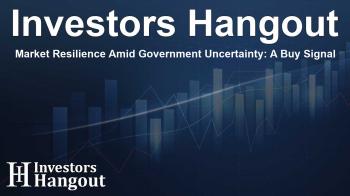Market Resilience Amid Government Uncertainty: A Buy Signal

Government Shutdown Predictions and Market Implications
Vice President JD Vance has signaled that a government shutdown is on the horizon due to ongoing conflicts related to healthcare funding.
According to recent insights from financial analysts at LPL Financial, despite the concerns surrounding the impending shutdown, this situation could create unique investment opportunities. Their analysis suggests that any downturn in the market should be seen through an optimistic lens as a potential buying chance, emphasizing that the underlying bull market is still viable.
Potential Shutdown and Its Causes
“I think we're headed to a shutdown because the Democrats won't do the right thing,” Vance commented, attributing the potential crisis to Democratic leaders who are linking government funding to negotiations over healthcare issues.
This ongoing political stalemate has increased speculation in the markets, with betting odds indicating a 63% chance of a shutdown happening soon. Democratic representatives have maintained a firm stance, insisting that they will not consent to a spending bill without significant concessions regarding healthcare, including efforts to reverse previous Medicaid cuts instituted by the White House.
Historical Context: Short-lived Shutdowns
Historical patterns suggest that government shutdowns are typically brief, averaging eight days in duration since the mid-1970s. This historical perspective gives analysts, such as those at LPL Financial, a basis for their recommendation to consider a market dip as a tactical buying opportunity.
Adam Turnquist, Chief Technical Strategist at LPL Financial, has observed certain market signs that indicate a pullback could be beneficial. These overbought conditions combined with diverging market performance might contribute to healthy corrections in stock prices.
Long-term Outlook Remains Positive
Investors should take heart from the commentary surrounding the long-term trajectory of the market, which remains encouraging. Analysts assure market participants that fundamental drivers, which support growth, are intact. Strong earnings reports, a cycle of rate cuts from the Federal Reserve, and steady investments in sectors like artificial intelligence are pivotal in sustaining this bull market.
Typically, investment responses to budget-related disruptions have been positive as they focus on more comprehensive economic factors and corporate performance indicators.
Financial Markets and Government Services
Jim Bianco, President at Bianco Research LLC, emphasizes that the more significant threat to financial markets isn't the shutdown itself, but rather the interruption of government services that yield vital economic data. The influence of these delays can manifest quickly; for example, a government closure could prevent the release of key reports like unemployment figures and payroll statistics.
This 'data blackout' can hamper analysts and investors from making informed decisions, driving home the urgency for clarity on fiscal matters.
Market Reactions and Current Price Trends
The markets are currently reacting in anticipation of these events. The SPDR S&P 500 ETF Trust (NYSE: SPY) experienced a premarket drop of 0.19%, closing at $662.44, while the Invesco QQQ Trust ETF (NASDAQ: QQQ) saw a slight decline of 0.16%, reaching $597.80, reflecting the market's nervousness amidst the uncertainty.
Despite these shifts, the overarching sentiment remains that any dips should be seen strategically, promoting the idea that now may be the time for investors to capitalize on potential future growth.
Frequently Asked Questions
What is the main concern regarding a government shutdown?
The main concern lies in the disruption caused by a shutdown, particularly the suspension of critical government services that produce vital economic data.
How long do government shutdowns typically last?
Historically, government shutdowns have averaged around eight days in duration since the 1970s.
What do analysts suggest regarding market movements during a shutdown?
Analysts generally advise viewing market downturns during a government shutdown as buying opportunities, as the long-term bull market is expected to continue.
What are the current market trends for SPY and QQQ?
As of the latest data, SPY is priced at $662.44 and has seen a decrease of 0.19%. Meanwhile, QQQ stands at $597.80 with a decline of 0.16%.
What are some key factors supporting the bull market?
Factors supporting the bull market include strong corporate earnings, a potential rate-cutting cycle from the Federal Reserve, and ongoing investments in technology sectors like artificial intelligence.
About The Author
Contact Riley Hayes privately here. Or send an email with ATTN: Riley Hayes as the subject to contact@investorshangout.com.
About Investors Hangout
Investors Hangout is a leading online stock forum for financial discussion and learning, offering a wide range of free tools and resources. It draws in traders of all levels, who exchange market knowledge, investigate trading tactics, and keep an eye on industry developments in real time. Featuring financial articles, stock message boards, quotes, charts, company profiles, and live news updates. Through cooperative learning and a wealth of informational resources, it helps users from novices creating their first portfolios to experts honing their techniques. Join Investors Hangout today: https://investorshangout.com/
The content of this article is based on factual, publicly available information and does not represent legal, financial, or investment advice. Investors Hangout does not offer financial advice, and the author is not a licensed financial advisor. Consult a qualified advisor before making any financial or investment decisions based on this article. This article should not be considered advice to purchase, sell, or hold any securities or other investments. If any of the material provided here is inaccurate, please contact us for corrections.

